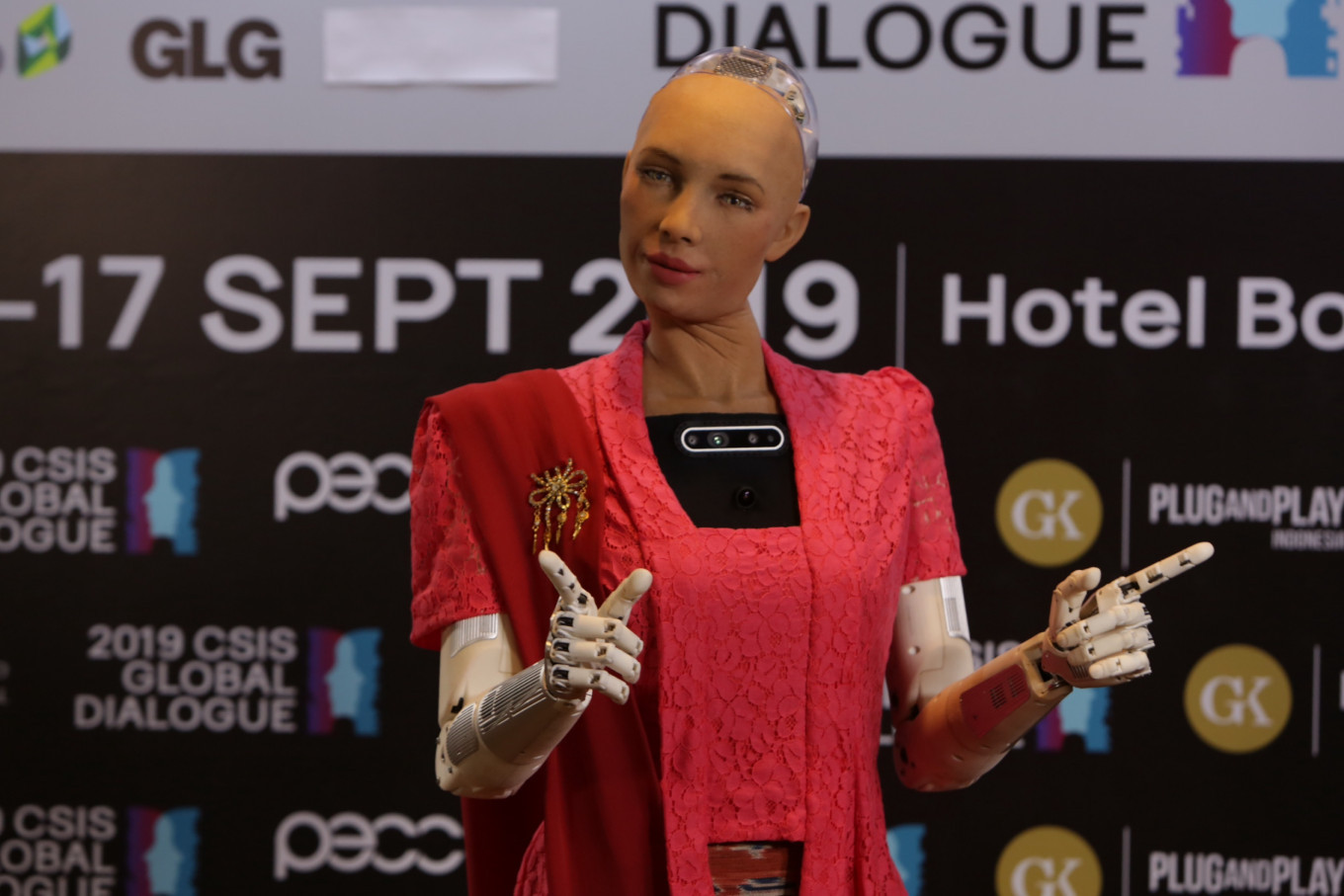Popular Reads
Top Results
Can't find what you're looking for?
View all search resultsPopular Reads
Top Results
Can't find what you're looking for?
View all search resultsUrban Chat: My robots of the week: Yoshi and Sophia
Who can survive the – to borrow a term of Richard Baldwin – globotics upheaval?
Change text size
Gift Premium Articles
to Anyone
A
few years ago, my friend Debs, a human resources executive at a renowned foreign bank, sent out a reading on jobs that would be replaced by machines in a decade or so.
It was not one of those the-apocalypse-is-here kind of texts, but a sobering one that employed logic and referred to real tech.
I nodded along and, upon noticing that some of the jobs listed were in the banking industry, half-jokingly asked Debs if she felt her job would survive the tech revolution. She never answered. But hey, Debs is always too busy.
As artificial intelligence (AI) startup Glair CEO Michell Handaka explained earlier this week during the Centre for Strategic and International Studies (CSIS) Global Dialogue on frontier technologies, at least a dozen "smart" machines already help a typical urbanite on a regular basis, perhaps without him/her much noticing it –– from alarm arranging for timely quality sleep and transportation apps plotting the most efficient commuting route based on traffic reports to delivery systems suggesting meals based on past orders and searches. And let’s not forget dating platforms seeking out your perfect match.
Yet the applications mentioned above, as well as digital assistants like Siri and Alexa, are relatively faceless thinking machines, subtly working behind cold facades of gadgets. What about those with a face, a name, the ability to converse and even a citizenship?
I was in Singapore last week, and the downtown hotel I stayed at employs many machines, from the check-in process to delivering amenities to guest rooms –– the latter of which is the task of Yoshi and Yolanda, robots similar to R2D2, but taller.
Both have motion sensors that factor in other objects, including humans, in their navigation, and while none can converse, both are programed with popular movie catchphrases, perhaps as a mild semblance of personality.
Providing more amusement than function at this stage, the two purple tubular bots are unmistakably just another step in the machination of the service industry. I remember how automated the Formule 1 hotel chain in France already was in summer 1993; I'm surprised that fully-robotic Fly Zoo Hotel in China has yet to become the norm in 2019.
Only a day after bidding Yoshi goodbye, thanks to the aforementioned CSIS Global Dialogue, I met the much more advanced Sophia here in Jakarta.
Tagged as the world's first "living" robot, the three-year-old creation of Hong Kong-based Hanson Robotics resembles humans in shape and size, with a face reportedly rendered from Audrey Hepburn.
What can Sophia do? Based on her two public sessions, I conclude that she can answer questions, respond to certain greetings, refuse unwanted touching, complain about not having received a passport though having been granted citizenship by Saudi Arabia and deliver sardonic puns that sound more like Katharine than Audrey Hepburn.
However, based on her slow response to my question about which she preferred in terms of beauty: Monet paintings or Nyoman Nuarta sculptures, a question I had to repeat, I conclude that Sophia is not wired for highly subjective matters.
Financial analysts have a reason to start worrying about robots taking over; art critics and fashion designers like Didiet Maulana, who dressed Sophia for her Jakarta engagements, may relax for now.
And is not that the heart of this controversy, that machines will take over the world and replace human beings?
After all, Wojtek Krok from McKinsey did say that there were technologies to perform about half of the tasks in most common jobs — corporations just haven’t seized them up. Many other speakers openly agreed that many tasks could and would be passed on to artificial intelligence behind machines, yet jobs and income opportunities for humans may not necessarily disappear — they would just need to evolve.
Evolve to what? In his very insightful keynote, business magnate Victor Fung put forward the “man-machine” notion — learned humans who use humanity and forward thinking to drive, direct and coexist with AI.
In other words, if you continue to be the lazy idiots who lack the discipline to continue learning and growing, or even just to queue properly, like many Indonesians are, then you may just not survive.
Who else can survive the – to borrow Richard Baldwin’s term – globotics upheaval?
The ones armed with skills that can be accessed via digitech by any market outside geographical boundaries — a “telemigration”, an arbitrage in labor service. Herein lies the challenge for government to harness the potential, including income tax.
So yes, some tasks have gone to machine learning and will stay there, and there will be disruption in many employment fields, but that doesn’t mean that we will automatically lose our source of income if we can ride the momentum.
The question is, with the likes of Yoshi and Sophia among us, how ready are you to get yourself upgraded?
Lynda Ibrahim is a Jakarta-based writer with a penchant for purple, pussycats and pop culture.











